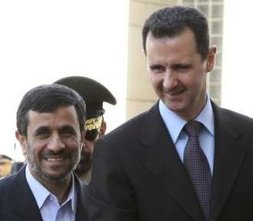 By George H. Wittman
By George H. Wittman
There has been considerable speculation behind the visit to Lebanon of Iran’s president, Mahmoud Ahmadinejad. The generally accepted theory is the egocentric desire of the Iranian leader to bask in the Lebanese sunshine of acceptance as a “protector” against Israel.
With armed Hezbollah militia acting as a local praetorian guard, Ahmadinejad launched himself into public appearances as if he were running for local office. The Hezbollah-guided crowds needed little encouragement to give the diminutive Persian a heroic reception. One would have thought the screaming Lebanese had lost their traditional love of secular advantages in favor of Iran’s austerity. One unimpressed local journalist marked the people’s reaction by noting cynically, “No matter how they stand (politically) my Lebanese love rock stars.”
Ahmadinejad certainly received his rock star welcome and his propagandists played the visit internationally for all it was worth. But the official Iranian flacks had overlooked the timing of the Chilean miners rescue that occupied TV worldwide. In the end, though, it didn’t really matter. The boss didn’t notice anything. He was in his element grinning and waving at the crowds while shaking his rhetorical fist at Israel.
Behind the scenes, however, is the fact that Syria is increasingly unhappy with the growth of Iranian influence in Lebanese politics. The deal among Hezbollah, Iran, and other Moslem political groups in Beirut always was supposed to be that Damascus would exercise the lead role in Lebanese political life. Recently Syrian intelligence is reported to have substantially infiltrated Hezbollah, aided by a considerable increase in military supplies from Damascus. Ahmadinejad’s presence in Lebanon was supposed to counter this and be a reminder to certain Hezbollah leaders of where their original training and support had come.
Mahmoud Ahmadinejad’s heralded visit was as much a regional statement as it was for local Lebanese consumption. The Iranians have a three-pronged offensive in progress: Shia alignment in Iraq, Hamas allegiance in Gaza, and Hezbollah’s ruling desires in Lebanon. The Syrians see this as the first steps in an attempt by Tehran’s clerical leadership’s plan for a Greater Persia — and Damascus doesn’t like what it sees.
The years of competition between the Syrian and Iraqi wings of the Baath Party were abruptly changed with the dissolving of Saddam Hussein’s control over Iraq. The Shia of that country never had an important Baath status. It was Saddam’s Sunni brethren who dominated and supported Iraq’s Baathist pseudo-socialist character. Syria played host to thousands of Sunni Baathists during the U.S. invasion and occupation.
The Shia Alawite leadership of Bashir al-Assad has no interest in allowing the evolution of Iranian Shia suzerainty over Syria’s neighbors, Iraq and Lebanon. It must be remembered that Syria is a majority Sunni country. The al-Assad leadership clan is far more instructed by its regional Alawite sect affiliation than its Shia religious consciousness. And this is to say nothing of the long-term friendly coexistence between the Lebanese Maronite Christian Franjieh clan and the extended Assad family going back to the days of 1957 when Hafez al-Assad was a Syrian intelligence officer in charge of protecting the fleeing Suleiman Franjieh (the elder).
None of this has much meaning for Ahmadinejad, who is is intellectually and politically not in the power class of the clerical leadership in Tehran. He will remain around only for as long as Iran’s Supreme Leader and his military power center, the Islamic Revolutionary Guard Corps, wish him to do so.
The Iranian president’s theatrics in Lebanon inadvertently fit right in with Bibi Netanyahu’s warnings on Iranian intentions against Israel. From supporters of Obama to opponents of Sarkozy, there have been urgent calls for the Israelis to dial down their rhetoric of fear of the Persian bomb. Perhaps someone should have told Ahmadinejad that the more he rants for the benefit of his followers, the more he loses in terms of Western government restraint on the Israelis.
Parades in Beirut and speeches in a village overlooking the Israeli border serve the purpose of the clerical leadership in Iran in terms of flexing their regional muscle. They want to keep Damascus alert to Tehran’s outreach and international status. It also reminds the United States, and the West in general, that they have more than Persian nuclear development to worry about while they are pressing ahead with sanctions.
Greater Persia may seem a dream to some outside of Iran. But in Iran and the region it seeks to dominate, it’s real enough. Just ask anyone in Bashar al-Assad’s entourage. They still believe in a Greater Syria! AS

Leave a Reply
You must be logged in to post a comment.